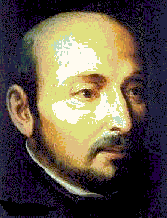Ignatius of Loyola, St.
Ignatius of Loyola, St.
Copyright © 2025 bible.booksAI.org - All rights reserved)

Ignatius of Loyola, St.
Born in the Basque province of Guipuzcoa, Spain, Ignatius of Loyola became one of the most influential figures in the Catholic Reformation of the 16th century, and along with a few companions founded the Society of Jesus (Jesuits) in Paris in 1534.
In his early life he entered diplomatic and military service under one of his noble relatives, Antonio Manrique de Lara, duke of Najera and viceroy of Navarre. While defending the citadel of Pamplona against the French, Ignatius was hit by a cannonball on May 20, 1521, sustaining a bad fracture of his right leg and damage to his left. This event closed the first period of his life, during which he was, on his own admission, "a man given to the vanities of the world, whose chief delight consisted in martial exercises, with a great and vain desire to win renown" (Autobiography, 1).
Undergoing a deep religious conversion during his convalescence, he now sought to soldier for God, in the battle for minds and hearts that was unleashed by the Reformation. After various searchings, he discerned his vocation to found a new, active religious society of a non-monastic kind, prepared to work for the church both in counteracting the schismatic effects of Protestantism and in missionary work in the new areas of the world that were opening up to 16th-century Spain.
In 1539 he and his companions took a vow of obedience to a superior elected by themselves, alongside the vow of obedience to the Roman pontiff that they had already taken. In 1540 Pope Paul III approved the new order, and Ignatius of Loyola became its first superior general. By the time of his death there were already over 1,000 Jesuits divided into 12 provinces; and the order's work was being spectacularly promoted by gifted missionaries like Peter Canisius (in Germany) and Francis Xavier (in India) and others in the Congo region and in Ethiopia.
Ignatius also left his mark on the city of Rome itself. He founded the Roman College, embryo of the Gregorian University, and the Germanicum, a seminary for German candidates for the priesthood. His most widespread legacy, however, is in the form of spiritual exercises that he developed, as a way towards greater self-knowledge and more authentic conversion.
Copyright © 2025 bible.booksAI.org - All rights reserved)